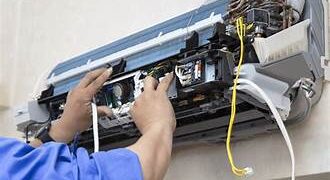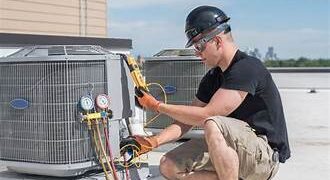As the temperature rises and your AC system becomes a crucial part of your daily life, ensuring its peak performance is key. Regular AC tune-ups play a vital role in maintaining efficiency and extending the lifespan of your system. Let's delve into the world of AC tune-ups, exploring the benefits and essentials that keep your home cool and comfortable.
Importance of AC tune-up
Regular AC tune-ups are crucial for maintaining the efficiency and longevity of your system. By scheduling routine maintenance, you can ensure that your AC unit operates at its best, providing optimal cooling during hot summer months.
Benefits of AC tune-up
- Lower Energy Bills: A well-maintained AC system consumes less energy, resulting in lower monthly utility bills.
- Improved Air Quality: Regular tune-ups involve cleaning or replacing filters, which helps to remove dust, allergens, and other pollutants from the air, improving indoor air quality.
- Extended Lifespan: Proper maintenance can prevent major breakdowns and prolong the life of your AC unit, saving you money on costly repairs or premature replacement.
Consequences of Neglecting AC Maintenance
- Costly Repairs: Ignoring regular maintenance can lead to minor issues escalating into major problems, requiring expensive repairs.
- Premature System Failure: Lack of maintenance can cause components to wear out faster, leading to the early failure of the entire AC system.
- Reduced Efficiency: Dirty filters, clogged coils, or low refrigerant levels can reduce the efficiency of your AC unit, resulting in higher energy consumption and reduced cooling performance.
Components checked during an AC tune-up
Regular AC tune-ups involve a thorough inspection of key components to ensure optimal performance and efficiency. HVAC technicians pay close attention to various parts of the system to address any potential issues before they escalate.
Refrigerant Levels and Airflow
During an AC tune-up, checking refrigerant levels is crucial as improper levels can lead to inefficient cooling or even system damage. HVAC technicians will inspect for any leaks and ensure that the refrigerant is at the correct level for optimal performance.
Additionally, they will also check the airflow within the system to guarantee that air is circulating properly. Poor airflow can result in uneven cooling and strain on the system.
Cleaning or Replacing Air Filters
One essential aspect of AC maintenance is cleaning or replacing air filters. Over time, air filters can become clogged with dust, dirt, and other debris, restricting airflow and reducing efficiency. HVAC technicians will clean or replace these filters during a tune-up to ensure that the system can operate at its best.
This simple task can improve air quality, reduce energy consumption, and extend the lifespan of the AC unit.
DIY AC maintenance tips
When it comes to maintaining your AC system between professional tune-ups, there are a few simple tips that homeowners can follow to ensure optimal performance and efficiency.
Cleaning the Outdoor Unit
Regularly cleaning the outdoor unit of your AC system is crucial for its efficiency. Remove any debris, leaves, or dirt that may have accumulated around the unit. Use a hose to gently clean the fins and coils, being careful not to damage them.
Keeping Indoor Vents Unobstructed
Make sure that all indoor vents are clear and unobstructed to allow proper airflow throughout your home. Blocked vents can restrict airflow and make your AC work harder than necessary, reducing its efficiency
.
Changing Air Filters Regularly
It is essential to change your AC system's air filters regularly to maintain good air quality and efficiency. Clogged filters can restrict airflow, causing your system to work harder and consume more energy. Check your filters monthly and replace them every 1-3 months, depending on usage.
Adjusting Thermostat Settings for Energy Savings
Optimizing your thermostat settings can help you save energy and reduce your utility bills. During the summer, set your thermostat to a higher temperature when you are away or asleep to reduce the workload on your AC system. Consider investing in a programmable thermostat for more precise control.
Signs that indicate the need for an AC tune-up
When it comes to your AC unit, there are several signs that indicate it may be time for a tune-up. Ignoring these signs can lead to bigger problems down the line, so it's important to address them promptly.
Reduced Cooling Performance
If you notice that your AC is not cooling your home as effectively as it used to, this could be a sign that it needs a tune-up. Reduced cooling performance can be caused by a variety of issues, such as dirty filters, low refrigerant levels, or a malfunctioning compressor.
A professional tune-up can identify and address these issues, restoring your AC's efficiency.
Strange Noises
Unusual noises coming from your AC unit, such as banging, rattling, or squealing sounds, are not normal and should be investigated. These noises can indicate loose or damaged components within the system that need to be addressed. A tune-up can help identify the source of the noise and prevent further damage.
Unusual Odors
If you detect strange odors coming from your AC vents, such as musty or burning smells, it could be a sign of mold growth, a clogged drain line, or electrical issues. These issues can impact your indoor air quality and should be resolved promptly through a professional tune-up.
Frequent Cycling On/Off
If your AC unit is constantly cycling on and off, it could be struggling to maintain the desired temperature in your home. This frequent cycling can put extra strain on the system and increase your energy bills. A tune-up can help identify the underlying cause of this issue and ensure your AC is functioning efficiently.
Scheduling a Tune-Up
It's recommended to schedule an AC tune-up at least once a year, ideally before the start of the cooling season. However, if your AC unit is older or has been experiencing frequent issues, you may want to consider more frequent tune-ups.
Additionally, if you notice any of the signs mentioned above, don't hesitate to contact a professional HVAC technician for a thorough inspection and tune-up.
Outcome Summary
In conclusion, prioritizing regular AC tune-ups not only saves you money in the long run but also ensures a healthy and comfortable indoor environment. By staying proactive with maintenance, you can enjoy optimal cooling performance and peace of mind throughout the year.
Expert Answers
How often should I schedule an AC tune-up?
It is recommended to schedule an AC tune-up at least once a year to ensure optimal performance.
Can I clean or replace air filters myself?
Yes, homeowners can easily clean or replace air filters to maintain AC efficiency between professional tune-ups.
What are the signs that my AC system needs a tune-up?
Common signs include reduced cooling performance, strange noises, unusual odors, or frequent cycling on/off.











